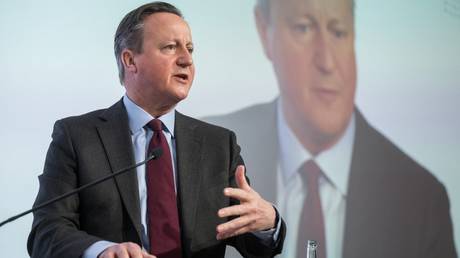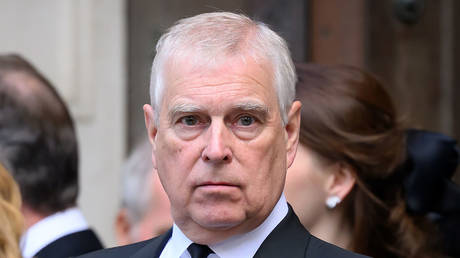
People need to be given a “political horizon” toward a state of their own, the foreign minister said
The UK is considering whether to officially recognize a Palestinian state, British Foreign Secretary David Cameron has revealed. Such a gesture would create “irreversible progress” toward peace in the Middle East, he believes.
Speaking at a reception for Arab diplomats in London on Monday, Cameron called for a ceasefire in Gaza, the release of Israeli hostages held by Hamas, and for the Palestinian people to be given “a political horizon” toward a two-state solution.
“We have a responsibility there because we should be starting to set out what a Palestinian state would look like; what it would comprise; how it would work,” he said in remarks reported by multiple British news outlets.
“As that happens, we, with allies, will look at the issue of recognizing a Palestinian state, including at the United Nations. This could be one of the things that helps to make this process irreversible.”
Recognizing Palestinian statehood would be a landmark diplomatic move for the UK. The British government said in 2011 that it would recognize a Palestinian state, but not as a full-fledged member of the UN. Three years later, the House of Commons passed a motion calling on the government to declare recognition, but Cameron, who was prime minister at the time, did not do so.
The UK’s official position, set out by Britain’s ambassador to the UN General Assembly in November, is that Britain “will work with our partners towards a two-state solution, based on 1967 lines with Jerusalem as a shared capital.”
The term “1967 lines” refers to Israel’s borders as they stood before the Six-Day War. A return to these lines would see Gaza expand, while Israeli security forces and settlers would withdraw from the West Bank, Golan Heights, and West Jerusalem.
The idea is a non-starter for Israeli Prime Minister Benjamin Netanyahu, who has long opposed the creation of an independent Palestinian state. “I will not compromise on full Israeli security control over the entire area in the west of Jordan – and this is contrary to a Palestinian state,” he said earlier this month, with “west of Jordan” including both the West Bank and Gaza.
Netanyahu issued this statement a day after speaking to US President Joe Biden, who said he had spoken to the Israeli leader about several potential routes to a two-state solution. The UK and UN condemned Netanyahu over his refusal to compromise, with UN Secretary-General Antonio Guterres describing “the denial of the right to statehood for the Palestinian people” as “unacceptable.”
Netanyahu is not alone in opposing such a solution. A Pew Research survey last year found that only 35% of Israelis “believe that Israel and an independent Palestine can coexist peacefully,” down from 50% in 2013.
The Palestinian Authority, which governs the West Bank, backs a two-state deal. Hamas, which governs Gaza, rejects the proposal, demanding a nation that extends “from the river to the sea” – a claim covering all of present-day Israel.
Some 139 of 193 UN member states recognize the State of Palestine. Israel is recognized by 165.




